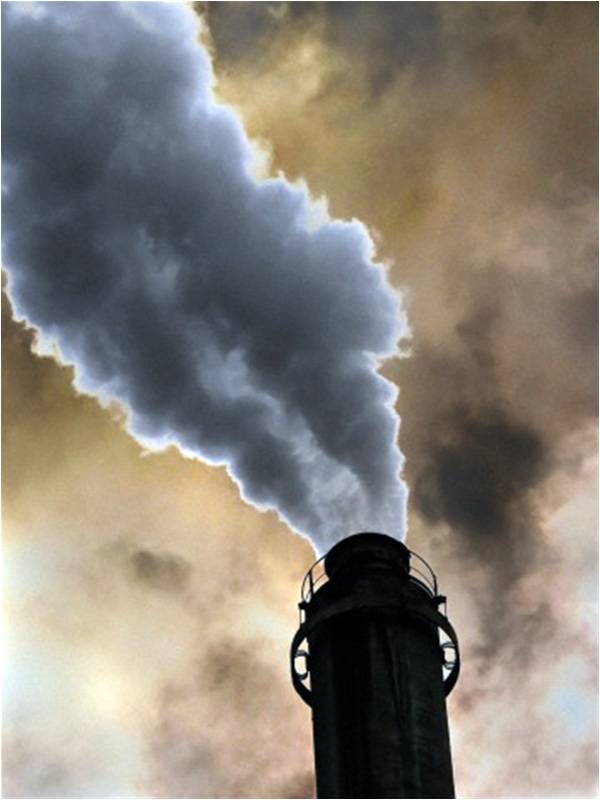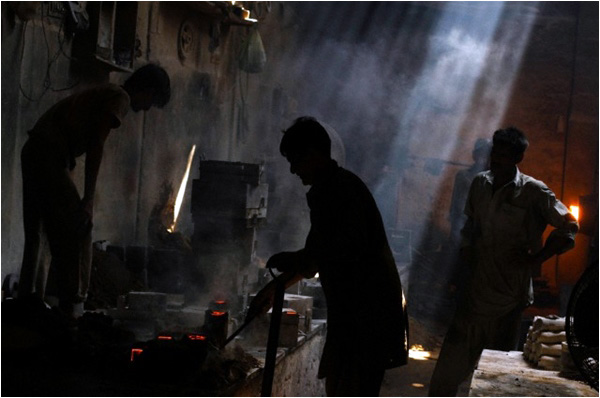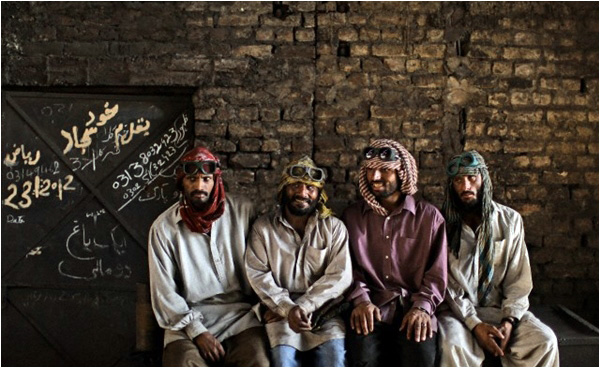
Most of Pakistan’s state-owned corporations are in the red, and profusely bleeding. Even the Privatization Commission and Pakistan Cricket Board are living off the blood and sweat of poor Pakistanis. In 2013-14 alone, the federal government doled out about Rs 95 billion to a handful of state corporations in the name of stabilization and restructuring.
Among them, Pakistan Steel Mills (PSM) stands out as a white elephant – surviving on massive financial infusions by the central government for decades, with its resources being plundered by the colluding trio of the management, the contractors and the suppliers.
In April, the government handed out an Rs 18.5 billion bailout package to this den of corruption, where according to a presentation to the prime minister in April 2013, average monthly losses run at a whopping Rs 1.5 billion. In 2009, the PSM received a bailout package of Rs 40.5 billion. Yet, the massive corruption, mismanagement and vested interests have rendered it good for nothing, with the result that in October, the plant could produce only 1,870 tons of iron and steel – a small fraction of its daily capacity of 91,667 tons. In fact, it has been running at a mere ten percent of its capacity most of the time in the last several years. Insiders say its cumulative liabilities currently stand at over Rs 260 billion.
The PSM has been a classic case of managerial fraud, willful bureaucratic deception, political patronage of professional incompetence, and blatant abuse of the governmental authority to appoint cronies. Why then do we continue injecting money into a bottomless pit?
Potential investors with inside knowledge say the Pakistan Steel Mills promise much more than what the doctored balance sheets say. An encounter with an industry lobbyist offers an instructive insight into the reasons behind the scramble for the PSM. After a tour of the massive premises in July 2005, a German member of parliament Klaus-Werner Jonas was ecstatic with the expanse of the country’s largest steel producing entity. Jonas, at the time, headed one of the economic affairs committees of the German parliament, Bundestag, and left the PSM overwhelmed, recalls an engineer who worked there.

“He could not withhold his appreciation over what he called a fantastic piece of land — 19,200 acres in all,” the engineer had told me. “The landmass alone is priceless, it’s like a gold mine,” an excited Jonas told me later, during an encounter in Islamabad.
Then, on March 31, 2006, the Privatization Commission, then headed by Awais Ahmed Khan Leghari, decided to sell 75 percent shares of the PSM for Rs 21.68 billion ($362 million), to a consortium consisting of Arif Habib Securities (Pakistan), Al Tuwairqi (Saudi Arabia) and Magnitogorsk Iron & Steel Works Open JSC (Russia). The cost per share was Rs 16.80.
Arif Habib had then spoken of putting in only about Rs 60 million to increase the mills’ capacity to 1.5 million tons, although the then-chairman had said several million dollars were needed to buy two coke-oven batteries. This explains the difference of approaches between government officials and private sector investors.
The Supreme Court scrapped the deal saying the fundamental evaluations and the share values did not reflect the real assets and their market value. The court said it did not mean to interfere in business transactions, but would be concerned if such a transaction lacked transparency.
A former federal secretary and the PPP-appointed chairman, Usman Faruqui, was charged with corruption involving deals at the PSM amounting to Rs 1.6 billion. He was acquitted by an Accountability Court in 2010.
During the PPP’s last tenure, the FIA probed an alleged corruption of Rs 22 billion. This scandal surfaced on the heels of the staggering Rs 46 billion losses that the PSM suffered in 2010-12.

The Expression of Interest call made by the Musharraf-led government had included 19,600 acres of land in the PSM’s assets. But the latest EoI for the appointment of the financial adviser (October 25, 2014) says the enterprise has 18,600 acres of land. Where are the missing 1,000 acres of land?
On my personal request –following a journalistic inquiry in Karachi – the then minister of privatisation, Dr Hafeez Shaikh, had agreed to revise the initial EoI, whereby the potential buyer would be awarded only about 4,547 acres of land on which the actual plant is located. Critics say even this revision had a catch: there is no balance sheet for the 4,547 acres, since the entire landmass is legally one piece and belongs to the federal government. And had the 2006 deal gone through, the buyers would have ended up with the entire land of the PSM.
Insiders say that up to 2,000 acres of PSM land along the National Highway – with a market value of about Rs 50 billion – is being used commercially. One can imagine the price of the entire 19,600 acres. The next step, they say, is the raising of housing societies on the mill’s lands, which The PPP, the PML-N, and the Steel Mills management are facilitating.
The only answer to the PSM’s problems lies in privatizing the state enterprise, the way it happened in Germany, where huge entities were sold for symbolic prices like one Mark. This privatisation must be free of deception, such as doctored documents. The Parliament needs to take this issue up to ensure transparency and prevent appropriation of land that is worth nearly a billion dollars.
Among them, Pakistan Steel Mills (PSM) stands out as a white elephant – surviving on massive financial infusions by the central government for decades, with its resources being plundered by the colluding trio of the management, the contractors and the suppliers.
In April, the government handed out an Rs 18.5 billion bailout package to this den of corruption, where according to a presentation to the prime minister in April 2013, average monthly losses run at a whopping Rs 1.5 billion. In 2009, the PSM received a bailout package of Rs 40.5 billion. Yet, the massive corruption, mismanagement and vested interests have rendered it good for nothing, with the result that in October, the plant could produce only 1,870 tons of iron and steel – a small fraction of its daily capacity of 91,667 tons. In fact, it has been running at a mere ten percent of its capacity most of the time in the last several years. Insiders say its cumulative liabilities currently stand at over Rs 260 billion.
"The landmass alone is priceless; it's like a gold mine"
The PSM has been a classic case of managerial fraud, willful bureaucratic deception, political patronage of professional incompetence, and blatant abuse of the governmental authority to appoint cronies. Why then do we continue injecting money into a bottomless pit?
Potential investors with inside knowledge say the Pakistan Steel Mills promise much more than what the doctored balance sheets say. An encounter with an industry lobbyist offers an instructive insight into the reasons behind the scramble for the PSM. After a tour of the massive premises in July 2005, a German member of parliament Klaus-Werner Jonas was ecstatic with the expanse of the country’s largest steel producing entity. Jonas, at the time, headed one of the economic affairs committees of the German parliament, Bundestag, and left the PSM overwhelmed, recalls an engineer who worked there.

“He could not withhold his appreciation over what he called a fantastic piece of land — 19,200 acres in all,” the engineer had told me. “The landmass alone is priceless, it’s like a gold mine,” an excited Jonas told me later, during an encounter in Islamabad.
Then, on March 31, 2006, the Privatization Commission, then headed by Awais Ahmed Khan Leghari, decided to sell 75 percent shares of the PSM for Rs 21.68 billion ($362 million), to a consortium consisting of Arif Habib Securities (Pakistan), Al Tuwairqi (Saudi Arabia) and Magnitogorsk Iron & Steel Works Open JSC (Russia). The cost per share was Rs 16.80.
In October, the plant could produce only 1,870 tons of iron and steel – a small fraction of its daily capacity of 91,667 tons
Arif Habib had then spoken of putting in only about Rs 60 million to increase the mills’ capacity to 1.5 million tons, although the then-chairman had said several million dollars were needed to buy two coke-oven batteries. This explains the difference of approaches between government officials and private sector investors.
The Supreme Court scrapped the deal saying the fundamental evaluations and the share values did not reflect the real assets and their market value. The court said it did not mean to interfere in business transactions, but would be concerned if such a transaction lacked transparency.
A former federal secretary and the PPP-appointed chairman, Usman Faruqui, was charged with corruption involving deals at the PSM amounting to Rs 1.6 billion. He was acquitted by an Accountability Court in 2010.
During the PPP’s last tenure, the FIA probed an alleged corruption of Rs 22 billion. This scandal surfaced on the heels of the staggering Rs 46 billion losses that the PSM suffered in 2010-12.

The Expression of Interest call made by the Musharraf-led government had included 19,600 acres of land in the PSM’s assets. But the latest EoI for the appointment of the financial adviser (October 25, 2014) says the enterprise has 18,600 acres of land. Where are the missing 1,000 acres of land?
On my personal request –following a journalistic inquiry in Karachi – the then minister of privatisation, Dr Hafeez Shaikh, had agreed to revise the initial EoI, whereby the potential buyer would be awarded only about 4,547 acres of land on which the actual plant is located. Critics say even this revision had a catch: there is no balance sheet for the 4,547 acres, since the entire landmass is legally one piece and belongs to the federal government. And had the 2006 deal gone through, the buyers would have ended up with the entire land of the PSM.
Insiders say that up to 2,000 acres of PSM land along the National Highway – with a market value of about Rs 50 billion – is being used commercially. One can imagine the price of the entire 19,600 acres. The next step, they say, is the raising of housing societies on the mill’s lands, which The PPP, the PML-N, and the Steel Mills management are facilitating.
The only answer to the PSM’s problems lies in privatizing the state enterprise
The only answer to the PSM’s problems lies in privatizing the state enterprise, the way it happened in Germany, where huge entities were sold for symbolic prices like one Mark. This privatisation must be free of deception, such as doctored documents. The Parliament needs to take this issue up to ensure transparency and prevent appropriation of land that is worth nearly a billion dollars.

